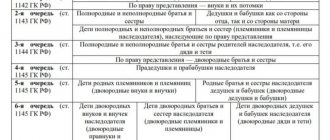It's sad to know, but quarrels over inheritance are a fairly common occurrence. Moreover, regardless of whether there is a will or inheritance by law. Sometimes even the closest people come into conflict because they feel deprived or deceived.
The law cannot prohibit relatives from quarreling. But it can establish a fair order that reduces the likelihood of conflicts with an adequate attitude to the issue.
In Russia, there is a procedure for distributing inheritance according to queues.
In this article we will look at how the inheritance is divided between the primary heirs who make up the closest family circle of the deceased person.
Inheritance by law. Order of heirs
Ancient wisdom says that in a good way, an inheritance should be shared with “warm hands.” That is, it is better to divide the future inheritance while the person is still alive and can come to an agreement with his relatives about what will go to whom after his death. The family finds compromises together, after which a will is written that suits everyone.
Unfortunately, this does not happen often, largely because it is not customary in our culture to talk openly about impending death. And after the death of the testator, the family begins to sort things out on their own.
If a will is not drawn up, the inheritance is distributed according to the law. 7 lines of inheritance have been defined in descending order of degree of kinship (and a special category: disabled citizens who lived as dependents of the testator). The principle is this: the entire inheritance goes to the first priority heirs.
If there are none (for example, they died earlier), the right of inheritance passes to the second. If there are also no heirs of the second stage, or they do not declare their rights to the inheritance, the right passes to the third stage, and so on.
In this article we consider the situation when there are heirs of the first priority and are ready to enter into inheritance rights. We will discuss all aspects of this process.
Heirs of the first stage. Division of inheritance
The first line of heirs are the people closest to the testator. Natural children and parents (consanguinity), plus spouses, adopted children and parents (the role of consanguinity in this case is played by legal, social and emotional ties).
So, the list of heirs of the first stage:
- Surviving spouse
- Children (blood, adopted/unborn)
- Parents (natural or adoptive parents)
The inheritance is divided equally among all claimants.
Husband wife
Only spouses officially registered in the registry office have the right to inherit from each other. A “civil” or church marriage, no matter how many years it lasts, does not serve as a basis for inheritance. Joint farming as well. Even if a divorce after a long marriage took place the day before the death of the testator, the husband/wife is excluded from the list of heirs.
ATTENTION! The widespread belief that the testator's spouse receives a larger share of the inheritance than other family members (more than half of the total property) is erroneous. This impression is created because people overlook one legal aspect of marriage - joint ownership of property.
The common property of the spouses is the so-called “jointly acquired property”, everything that they acquired while married. Before proceeding with the division of the inheritance, the share that legally belongs to the second spouse is allocated from the entire property. This happens according to the same principle by which property is divided during a divorce.
And after this initial division, that part of the property that is recognized as the share of the deceased is divided equally between all representatives of the first priority. The spouse participates in this division on an equal basis and receives the same amount as the others.
In other words, the spouse first receives 50% of the common property, and then an equal share of the testator’s personal property.
Difficulties (from the point of view of other heirs) may arise with different methods of registering property rights to objects that both spouses used.
For example, if the apartment in which the family lived was registered as the personal property of a living spouse, it is considered personal property and will not be divided among the heirs.
If the car was purchased in the name of the wife, then, despite the fact that the husband used it, after his death the car will not be considered an object of inheritance. It is the personal property of the deceased's wife.
An example of dividing an inheritance in the presence of common property
At one time, a husband and wife purchased a house that was jointly owned by them. The man has three children. After the death of the husband, the wife receives 1/2 share of the house. The remainder will be divided into 4 equal shares: one for each child and wife. Thus, the wife owns 5/8 of the share of the house, and the children own 1/8 each. All other property will be divided in the same way.
Children
All children of the testator enjoy equal rights when dividing the inheritance:
- Children born in an official, valid marriage
- Children born in previous marriages
- Illegitimate children of any age, provided that paternity is recognized or established
- Born after the death of the testator (within ten months)
Parents
Citizens who survive their children have the right to inherit after them as part of the first line.
Adoptive parents who have officially adopted the testator have the same rights as blood parents. Parents who are unmarried or divorced have equal rights, regardless of whether they lived with the testator or not.
A parent who has been deprived of parental rights to a given child by a court at one time is deprived of the right to inherit. If parental rights have not been restored during the life of the testator, his father or mother does not have the right to inherit from his child.
Other heirs of the first stage. Right of representation
The list of first-priority heirs does not include one category of close relatives – grandchildren. Since she is not in other queues, this often raises puzzling questions: “Can’t grandchildren inherit from their grandparents at all? After all, these older relatives inherit from their grandchildren in third place.”
In fact, grandchildren can directly inherit from their grandparents only by will. According to the law, they receive the inheritance of their grandparents after their parents. When, for example, father and mother received shares of their parents' inheritance. And then, in turn, they inherited the combined property of generations to their children.
But there are cases when the grandchildren of the testator are included in the first priority of inheritance. True, with certain reservations. This occurs if their parents (children of the testator) died before him, and is defined as “inheritance by right of representation.”
Grandchildren can inherit from their grandparents only by right of representation (excluding cases where they were adopted last after the death of their parents or deprivation of their parental rights).
Inheritance through the right of representation has one peculiarity: the heirs do not always receive an equal share with other heirs of the first priority. Their share is the share to which the person they represent was entitled.
That is, if there are more heirs by nomination than there were direct heirs of the first stage, then the share of each will be proportional to their number.
Example of inheritance by view
The deceased man has a living father and mother, a wife and three children together. But two children died in a car accident shortly before the death of the testator himself. Both left children: one has two, the other has one.
The inheritance (after allocating the marital share) is divided into six equal parts: father, mother, wife, and each of the three children. The shares of the deceased children of the testator pass to their children. One grandchild receives the full share of his parent, which is 1/6 of the inheritance. The two grandchildren receive their parent's share (1/6) and divide it in half. Everyone gets 1/12.
Inheritance by right of representation is a legal norm. An heir by nomination cannot be deprived of his share, except by the will of the testator, or in cases provided for by law (for example, declaring the heir unworthy).
Dependents
This is a special category of heirs, inheriting simultaneously with representatives of the current (called for inheritance) line. Family or legal connection in this case is an optional condition. “Common-law” husbands and wives who do not have the right to inherit can inherit if they are also dependents of the testator.
A citizen is recognized as a dependent if the following conditions are met:
- He must be disabled (for example, disabled)
- Have no other sources of income other than financial assistance from the testator
- Live with the testator until his death
- Live with the testator for a year or more before his death (this condition is not mandatory if the dependent was a blood relative of the testator)
Even if there is no first-priority heir, a disabled dependent cannot receive more than 1/4 of the first-priority share of the inheritance. The rest will “go down” in queues.
Forms of succession
There are three ways to inherit the property of a deceased person:
- in order of priority (participants in the division - immediate relatives and dependents);
- by will;
- in a mixed composition, when part of the property is transferred by will, and everything not taken into account in the document goes to the heirs by law (the same heir can receive property both by law and by will).
The husband could express in the testamentary document any wishes regarding the distribution of his property after death. It is only necessary that his intentions comply with the norms of Russian legislation. And for this you will need to consult with a competent lawyer who can assist in resolving issues in the field of family law and inheritance.
If a will is drawn up, the claims of the heirs are difficult to consider significant by law. Although individual clauses of the will, as well as the entire document, can be challenged in court in the following situations.
1. The property indicated is not the one that belongs to the testator.
2. The interests of the obligatory heirs are not taken into account:
- minors;
- disabled people (incapacitated potential legal successors);
- dependents with special status.
In such situations, mandatory heirs receive only 50% of the property due to them if they became heirs by law.
3. It turns out that the will was written:
- under pressure (physical, moral);
- as a result of misleading the testator;
- a person who is not fully aware of what he is doing.
4. The expression of will (including the determination of the size of shares or specific items and their identification) is not clearly defined.
5. The will states that a certain part of the property goes to the children (without taking into account their number and without indicating their names). But another child appears who also claims his part of the property, taking into account the reduction in the size of the shares of all other children.
6. The heir under the will was recognized as unworthy (Article 1117 of the Civil Code of the Russian Federation) if the illegal actions he committed were directed either against the testator or against other heirs. Also, an unworthy heir could act in the interests of third parties (seek illegally for them to receive certain shares) or seek to increase his share, although the testator initially did not want this (clause 1).
Distribution of inheritance among first-degree heirs. Shares
We have already touched on this issue in previous sections. Now let’s summarize all the information about legislative norms and summarize:
- The inheritance is divided equally among all representatives of the first stage
- If the testator’s spouse is among the first-priority heirs, first the “marital half” is allocated from the entire property (relatively speaking, the part that the spouse would receive in the event of a divorce). After this, the spouse participates in dividing the remaining part of the inheritance on an equal basis with the rest of the heirs
- If there is only one heir of the first stage, he inherits solely, completely
- If there are no first-line heirs, a disabled dependent may claim 1/4 of the inheritance
- Heirs by right of representation receive the share of the direct heir of the first stage who died before the testator. The only heir by right of representation has the right to a share the same as that of all heirs of the first priority. If there are several of them, they divide the share of the direct heir equally.
ATTENTION! Despite legal requirements, heirs of the first stage are not obliged to equally divide each object included in the inheritance. They can draw up an agreement on the basis of which, for example, one takes the car, the second garage, the third and fourth own the dacha in half, and so on. If an agreement cannot be reached, the division of property can be carried out through court proceedings.
Special circumstances
Firstly, after a divorce, a woman cannot claim her part of the inheritance by law. Only the person who was married to the deceased is considered the heir. All previous personal property obligations that the testator gave to his former spouse or other citizens cease to apply.
Secondly, all children of the deceased are considered the primary heirs. It does not matter here whether the testator was in a marital relationship with the woman who gave birth to his child. The main thing is to prove that the heir is his child. The lawyer involved will help you order a DNA test and subsequently go to court. Also, an intelligent lawyer can act on the side of the legal spouse and her children, proving that the newly-minted person cannot be considered the child of the testator.
For your information. The initiator of registration of inheritance (testator) is a subject who has reached the age of majority and is legally capable. Persons who become aware of the contents of the document, if the testator does not want it to be disclosed, are prohibited from transmitting the information to anyone (Article 1123 of the Civil Code of the Russian Federation). Even the fact of drawing up a will must remain secret.
Inheritance by will. Mandatory share
It is clear that if there is a will, the order of inheritance changes. A citizen has the right to bequeath his own property to whomever he finds necessary, even to a complete stranger or legal entity. In common parlance this is called “disinheritance,” and everyone has the right to do this to their relatives.
However, some categories of priority heirs do not lose the right to receive a certain share of the inheritance even in such a situation. The obligatory share of the inheritance is legally assigned to:
- Disabled husband or wife (pensioners and disabled people)
- Disabled parents (retired and disabled)
- Disabled children (pensioners and disabled people)
- Minor children (under 18 years of age at the time of death of the testator)
The obligatory share is half of the share to which the first priority heirs would be entitled in the absence of a will.
An example of obtaining a mandatory share
The woman bequeathed all her property to a charitable foundation. However, she has an elderly mother and a disabled husband. Without a will, the husband would have received the “marital half” and would have shared the other half with his mother. Since there is a will, the spouse’s share of the property acquired during the marriage is allocated (to which he is entitled regardless of the will), and then the mother and husband divide 1/2 of the remaining inheritance in half. The rest goes to the heir named in the will.
Role of the notary
Without it, property registration is impossible. The notary maintains documentation and registers applications for acceptance of inheritance from applicants for property. As an alternative, an application for a certificate is submitted.
If a will appears, the notary reads its contents to the heirs with a detailed description of the items. If necessary, interested parties are provided with consulting support.
As part of his work, the notary takes measures aimed at protecting valuables and issues a resolution on the issuance of part of the bank deposit to the heirs. To search for property, official requests are made to various authorities.
When all objects of property have been identified, the circle of heirs has been established, and the notary prepares certificates of inheritance. The amount of state duty that each person will have to pay is preliminarily calculated.
It often happens that there are several applicants for the same object. Then you can agree and conclude an agreement on the division of inherited property. There is no need to have it certified by a notary.
Inheritance terms for the first stage
The generally accepted period for entering into inheritance rights is 6 months. The countdown begins from the day of death of the testator, or from the date of the court decision declaring the citizen dead. There are a number of exceptions to this rule:
- The six-month period may be extended for valid reasons.
- An unborn heir of the first priority (a child of the testator who was not born at the time of his death) enters into the inheritance after his birth, even if 6 months have already expired.
- If there are no heirs of the first stage, the right to inherit passes to the second stage, and so on. After each transition, the six-month period starts anew.
You will find more detailed information about this in the article “The order of inheritance by law” posted on our website.
Court decision on division of inherited property
According to the circumstances of the case and Chapter 16 of the Civil Procedure Code, the court makes a decision on the division of property. The court must make one of the following decisions:
- Divide property in kind (establish equal shares of property for heirs by dividing it. For example, divide one plot of land into two plots of land);
- Determine the specific shares of the heirs in the property (for example, in case of common ownership of a house);
- Leave the property to one of the heirs and order this heir to pay monetary compensation to the other heir (for example, if it is impossible to divide the thing in kind);
- Sell the inherited property at auction and subsequently divide the proceeds between the heirs (for example, when inheriting a car).
If the heir does not agree with the court decision, then you can resort to appealing the court decision according to the rules of the third and fourth sections of the Civil Procedure Code. In this case, it is necessary, both in appeal and in cassation, to justify why the decision of the first instance court is being appealed. It is necessary to prove the fact that the case was incorrectly resolved by the court that considered the case on the division of property.
The court decision is formalized by the relevant legal act, which is binding.








